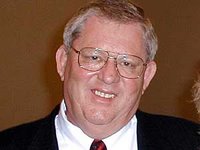 former south dakota governor bill janklow was convicted of felony second-degree manslaughter and misdemeanors for reckless driving, speeding, and running a stop sign in january 2004. “wild bill” had long boasted about his speeding and had amassed numerous citations, but this time he sped through a stop sign and his cadillac struck and killed motorcyclist randy scott.
former south dakota governor bill janklow was convicted of felony second-degree manslaughter and misdemeanors for reckless driving, speeding, and running a stop sign in january 2004. “wild bill” had long boasted about his speeding and had amassed numerous citations, but this time he sped through a stop sign and his cadillac struck and killed motorcyclist randy scott.
in addition to paying a fine, janklow served 100 days in jail and resigned his seat in the u.s. house. i’m writing about him now because the south dakota supreme court decided this month to reinstate his law license. judge glen severson, writing for the high court:
“While there are public concerns regarding Janklow’s driving, there was no evidence presented to suggest that the public needs protection from Janklow’s conduct as an attorney.”
that’s the funny thing about occupational sanctions that apply broadly to all felons — they often have very little to do with public safety. in california, felons are barred from some 261 job titles. in new york, ineligible occupations include barber shop owner, boxer/wrestler, commercial feed distributor, and emergency medical technician. in florida, the list includes acupuncturist, speech-language pathologist, and cosmetologist. most convicted cosmetologists, of course, lack the means to mount an appeal to the state supreme court. one st. paul pioneer press reader reacted to janklow’s story this way:
Different standard for Janklow?
I read with interest the Jan. 6 story about former South Dakota lawmaker Bill Janklow’s triumph over adversity (“Janklow can resume his law practice”). We should all remember that this comes after being convicted for offenses resulting in a motorcyclist’s death. By contrast, an acquaintance was fired from his job as a car mechanic and was told that he couldn’t pick up a wrench for five years, provided his record remained clean. His sin? Driving while drunk. There is no defense for this behavior from anyone. I will point out, however, that Janklow has been allowed to restart his practice although he hasn’t completed his probation — all before my friend can change your oil. How many standards do we have?
PATRICK QUINN
the felons that i interviewed argued for more narrowly-tailored collateral sanctions — in housing, receipt of public assistance, student aid, voting rights, parental rights, and firearms rights in addition to occupational restrictions. for example, some would ask “what did my assault conviction have to do with voting? i could see losing my vote if i tried to rig an election or something.” janklow’s lawyers made the same argument — what did his manslaughter conviction have to do with lawyering? the standard answer, made by supporters such as george will, is that felons have shown themselves to be “untrustworthy” citizens and therefore blanket restrictions are merited. yet this logic is pushed to absurdity by the dizzying array of lifetime bans imposed on felons.
if i could reinvent the parole and prisoner reentry process, i’d like to see all collateral sanctions imposed on a case-by-case basis in a reentry court. if someone has been convicted of molesting children, then it makes good sense to restrict them from occupations (such as school bus driver) in which they have access to children. i would similarly restrict mr. janklow from driving a school bus, but would likely be sympathetic to his desire to practice law or to pick up a wrench as a mechanic once he has served his sentence. under the current system, only those felons with the information, time, and resources to mount a clemency drive will ever see their rights restored.

Comments